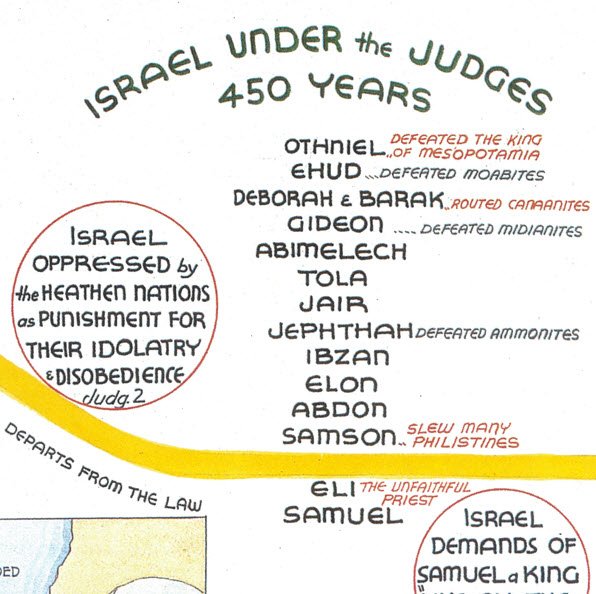The Judges of Israel
The Judges of Israel
After the death of Joshua and the elders who followed him, Israel quickly turned aside from worshipping Yahweh their God to follow the idolatrous practices of the nations of the land (Judges 2:6–13). Because of their wickedness, God allowed Israel’s enemies to overcome them so that they might turn back to Him for help and deliverance.
During the next 400 years God raised up a series of faithful men, called Judges, to deliver Israel from those who afflicted them and to encourage the people to return again to worshipping their God (Judges 2:16–19). Sadly, when each judge died, many of the people quickly reverted to idolatry and God again allowed the neighbouring nations to afflict them. Weary of oppression, the people cried to God once more, and He raised up another judge. Some of the judges who ruled during this period were men like Gideon, Samson, and Jephthah. The last judge to rule Israel was Samuel.
The period of the Judges has been described in these words: “In those days there was no king in Israel: every man did that which was right in his own eyes” (Judges 21:25).
Ruth the Moabitess
This little book tells of an incident that took place “in the days when the judges ruled” (Ruth 1:1). Although the book of Judges tells of widespread wickedness in the land, here we have the moving story of the faith of Ruth the Moabitess, who confessed to her mother-in-law Naomi, “Thy people shall be my people and thy God my God” (Ruth 1:16). She turned her back on the idols of Moab and went with Naomi to Bethlehem where she met God-fearing Boaz, who took her for his wife. Their offspring included King David (Ruth 4:22), and from him the Lord Jesus Christ (Matthew 1:5,16).
Samuel—the Last Judge
The two books of Samuel cover the history of Israel from the end of the period of the Judges through to the appointment of Saul and then David as kings over Israel. It was Samuel who, as judge and prophet (Acts 3:24), established the framework of “the Kingdom of Israel”.
The People Desire a King
Although Samuel was faithfully executing his office as Judge, the people were continually looking at the nations about them and eventually approached Samuel with their request for a king: “Make us a king to judge us like all the nations” (1 Samuel 8:4–5). Samuel was not pleased and turned to God in prayer. God’s answer is very illuminating: “Hearken unto the voice of the people in all that they say to thee: for they have not rejected thee, but they have rejected me, that I should not reign over them” (1 Samuel 8:7). God was their King, but they had not acknowledged nor appreciated this fact.
God granted their request and chose Saul to be their first king, a man whose outstanding physique impressed the people. Saul, however, failed to obey God’s specific commandments and so the Kingdom was taken from him (1 Samuel 15:22–28).
Adapted from “The Exploring the Bible Course” by David Evans

